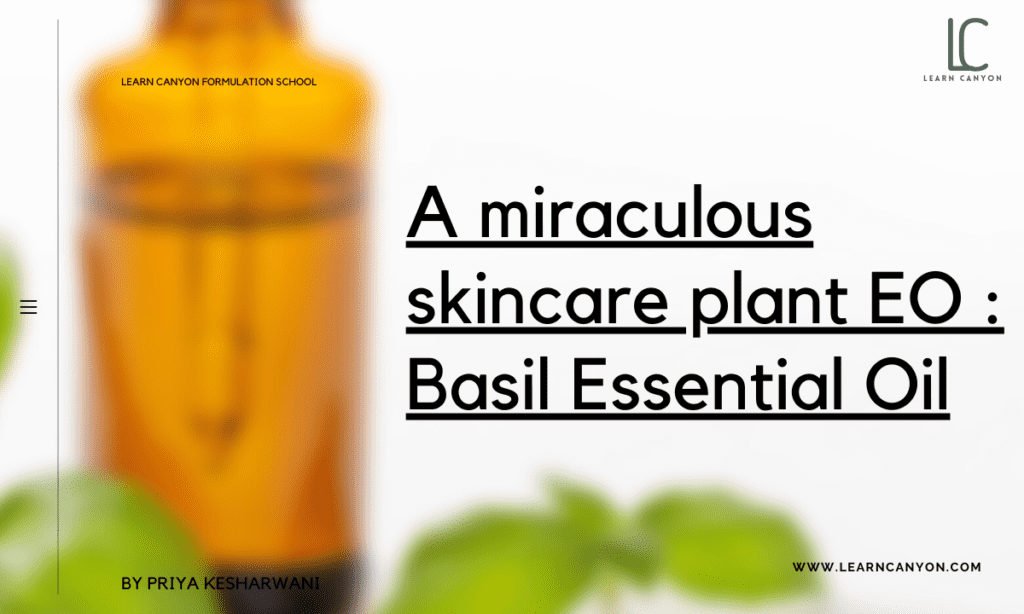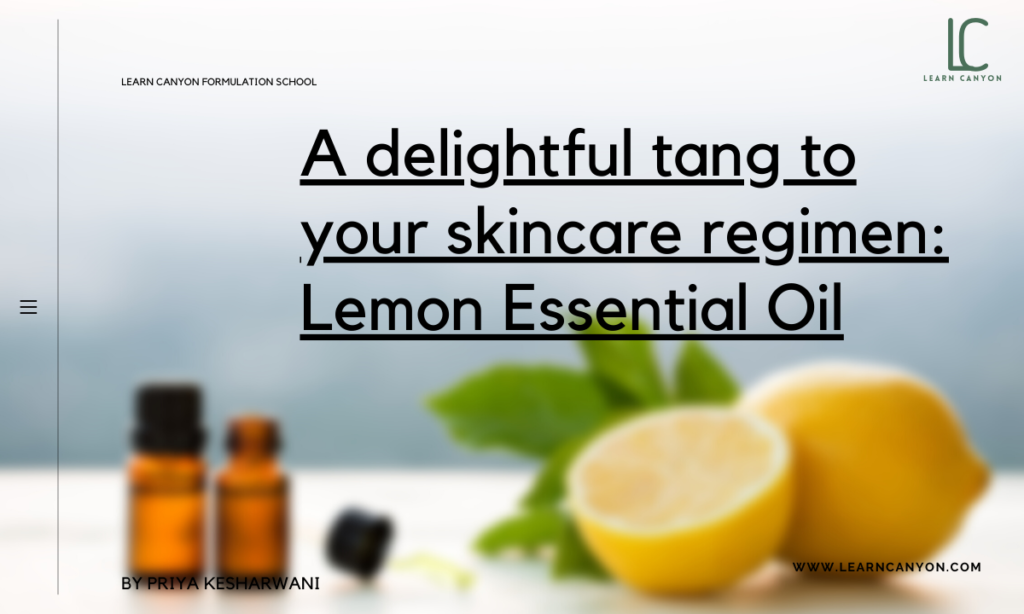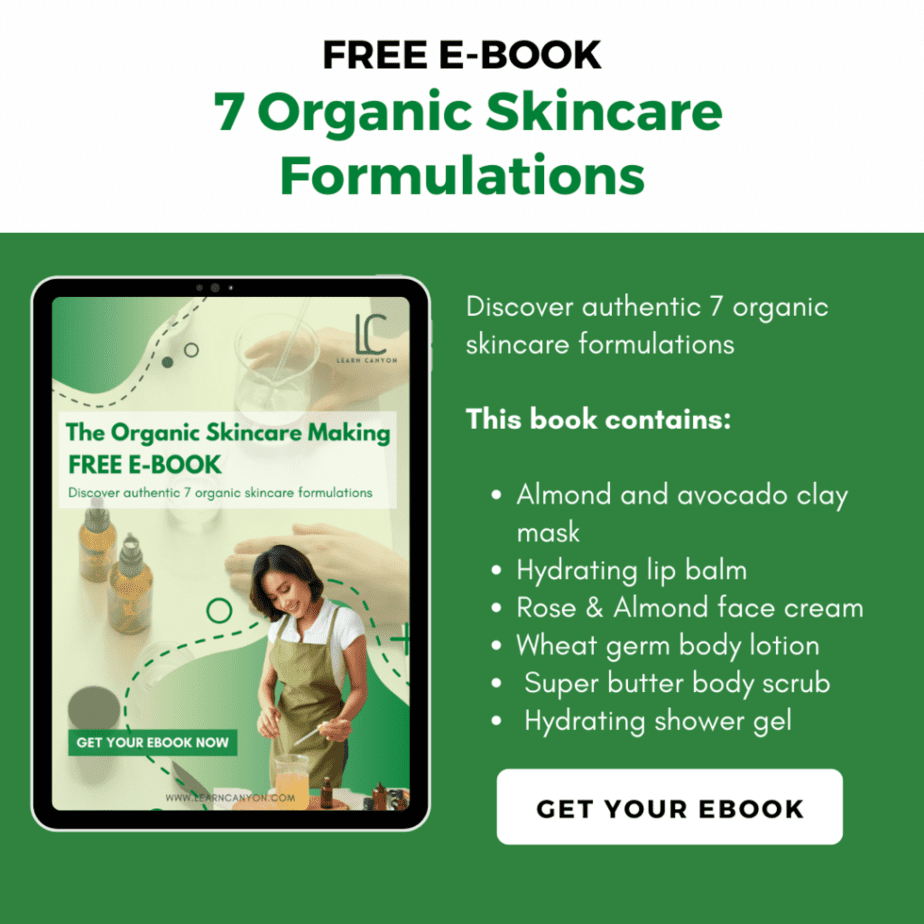
Lemon (Citrus limon) Peel essential oil

Lemon essential oil
Lemon Essential Oil is known as “Liquid Sunshine” because of its bright yellow colour, refreshing aroma, cleansing effects, and energy boost. Lemon Essential Oil has a lot of benefits outside of the kitchen, so adding it to your daily regimen could help your skin, mind, and health.
What is Lemon Essential Oil?
Lemon Essential Oil is extracted by cold pressing fresh lemon fruit peels containing volatile oil glands, often known as skins or rinds.
Lemon Oil has a thin, watery viscosity after extraction, a pale greenish-yellow colour, and a strong yet fresh aroma, which can be attributed in part to the chemical ingredient Limonene.
| What is it? | Lemon Essential Oil is extracted from fresh lemon fruit peels by cold pressing. |
|---|---|
| INCI | Citrus limon peel oil |
| Appearance | greenish-yellow colour |
| Texture | Thin, watery viscosity |
| Recommended Usage | 1-10% |
| Solubility | OIl soluble (Old expression) |
| Melting point | NA |
| Boiling point | NA |
| pH | NA |
| Aroma | They have a delicious, fresh scent with a sour undertone. |
| Why do we include it in formulations? | Lemon Essential Oil is refreshing, cleaning, and purifying. |
| How to work with it? | Include during the formulation's cool down phase, and prevent heating if as all possible. |
| Applications | Cellulite appearance is reduced. Moisturize and smooth dry skin while balancing oil production. |
| Absorption rate | Fast |
| Strength | Citrus notes are most often top notes. |
| Weaknesses | Irritation and burning: Before applying oils to the skin, always dilute them with a carrier oil. |
| Substitution | Orange peel |
| How to store it? | Keep it at room temperature, in an airtight container. |
| Shelf life | Lemon peel oil has a two-year shelf life when properly stored. |
| Type of ingredient | Essential oil |
|---|---|
| Main benefits | The antibacterial, astringent, and detoxifying qualities of lemon essential oil are all present. |
| Who should use it | Ideal for those with oily or acne-prone skin |
| How often can you use it? | If used consistently and during the day, the use of lemon essential oil in leave-on products should be minimised to reduce the risk of a reaction. |
| Works well with | They also go nicely with lavender, other bright oils like peppermint or rosemary, and spices like cinnamon or clove. |
| Doesn't work with | Because lemon essential oil makes your skin more sensitive to sun irritation, it's recommended to avoid direct sunlight when using it. |
| How to use | When the formulation is cooling down, this ingredient is added. |
Mechanisms of action
Lemon oil is one of a number of essential oils that can fight microorganisms on the skin. Lemon oil is used to treat a range of skin problems, including acne, according to Trusted Source.
Lemon essential oil can eliminate bacteria that get caught in pores and cause breakouts when diluted and applied topically. It can also help to clear your skin by gently exfoliating dead skin cells that become stuck in hair follicles and pores. Lemon oil includes limonene, a natural exfoliator.
Benefits of Lemon Essential Oil
From sunburns and insect bites to wrinkles, lemon essential oil has been discovered to have a number of skin benefits.
Lemon oils, which have astringent characteristics, can aid to improve the complexion, particularly for oily skin types prone to big pores. The properties of lemon essential oil make it a versatile cosmetics ingredient.
Lemon Essential Oil, when diluted and applied topically to the skin in cosmetic products, delivers various benefits to the skin, including a radiant complexion that feels healthy and smooth.
To moisturise chapped skin, reduce weariness and flu symptoms, stimulate energy and metabolism, improve mood, and tone the body, it can be added to massage mixtures or diluted in relaxing baths.
Lemon Oil may be used to diminish the appearance of cellulite in creams and lotions, and it can also be used as a tightening and toning astringent in face washes to reduce oil production.
Side effects of Lemon Essential Oil
If you’re up to date on your facts, you’re probably curious about the phototoxicity of citrus oil in skin care. Furanocoumarins are organic chemical compounds found in citrus oils that can cause light sensitivity and phototoxicity.
The usage of skin care products containing citrus essential oils can make your skin more sensitive to the sun. When the skin is exposed to UV radiation while wearing citrus essential oils, it can burn, blister, swell (edema), and perhaps raise the risk of cancer.
Lemon essential oil, like all essential oils, has the potential to cause some negative side effects.
How to use it in formulation?
The high number of antioxidants in lemon oil (which help fight these pesky free-radicals) combined with its natural astringent, anti-bacterial properties make it a very useful essential oil for very oily congested skins looking for a brighter, clearer looking radiance to the complexion when used as an ingredient in cosmetic skincare formulations. When the formulation is cooling down, this ingredient is added.
Works well with other ingredients
Natural Blends are mixtures of oils from diverse natural sources to create a cost-effective product that smells like pure oil. Lemon oil has been shown to help settle inflammation and reduce redness when combined with other essential oils such as lavender and chamomile.
Lemon is regarded to be a flavour enhancer and modifier. Chamomile, eucalyptus, frankincense, geranium, peppermint, sandalwood, and ylang ylang are just a few of the essential oils that go well with it.



